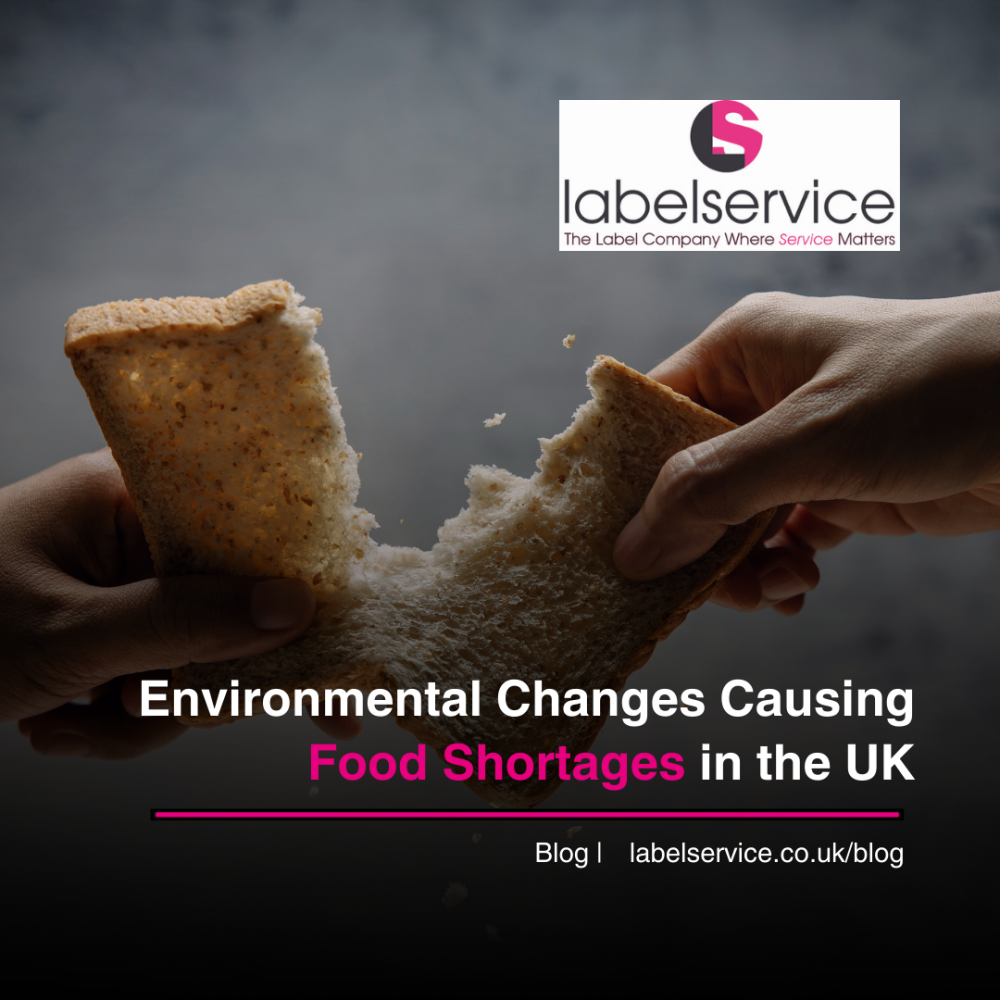Farmers have warned that more extreme weather in the UK is likely to be the main cause of food shortages in the next decade, which could in turn lead to civil unrest. That is the standout finding of new research by Anglia Ruskin, York, Bristol, East Anglia and City universities into the factors driving food insecurity. Asked what might cause food shortages in the years to come, three-quarters of farmers identified “extreme weather events” as a risk factor.
More farmers were concerned about this as a cause of food insecurity, compared with any other cause, including war, trade deals, and rising production costs. Total food output was also seen as more significant than food distribution.
Will White, sustainable farming coordinator at Sustain, said: “This evidence underscores the urgent need to address the threats to food security posed by extreme weather, a consequence of the ongoing climate crisis. “Food security and a healthy planet are two sides of the same coin. That’s why it would be a real mistake for the government to cut its investment in nature-friendly farming in the upcoming budget, which is fundamental to safeguarding long-term food security.”
The views were endorsed by arable farmer and chief executive of the Nature Friendly Farming Network, Martin Lines. “This year has brought unprecedented weather challenges for thousands of farmers. While I don’t want to face another year like it, we know we can expect more of this, and worse, in the future,” he said.
“The biggest threats to our food security come from climate change and nature loss. Farmers urgently need ambitious support to make their businesses and land healthier and more resilient.” Sustain notes that UK vegetable production alone has fallen by 2.2m tonnes, or 5%, in recent times, while results from Defra’s June census this year point to a significant contraction in the numbers of breeding sheep, cattle and pigs.
Crop Issues Due to Rain
The UK faces food shortages and price rises as extreme weather linked to climate breakdown causes low yields on farms locally and abroad. Record rainfall has prevented farmers in many parts of the UK from planting crops such as potatoes, wheat, and vegetables during the key spring season. Crops that have been planted are of poor quality, with some rotting in the ground.
The persistent wet weather has also meant a high mortality rate for lambs on the UK’s hills, while some dairy cows have been unable to be turned out onto grass, meaning they will produce less milk. Agricultural groups have said the UK will be more reliant on imports, but similarly wet conditions in European countries such as France and Germany, as well as drought in Morocco, could mean there is less food to import. Economists have warned this could cause food inflation to rise, meaning higher prices at supermarkets.
Tom Bradshaw, the president of the National Farmers’ Union, said markets had “collapsed” as farmers fail to produce food in the punishing conditions. He said: “We’re going to be importing a lot more product this year.” One major retailer said the wholesale price of potatoes was up 60% year on year as much of the crop had rotted in the ground.
Supplies of potatoes have also been affected by a 10% reduction in the area planted last year as farmers switched to less weather dependent and more financially secure crops. Industry insiders said they expected a further 5% fall in planting this year. Jack Ward, chief executive of the British Growers Association, said: “There is a concern that we won’t ever have the volumes [of potatoes] we had in the past in the future.”
He said wholesale prices were too low for farmers to generate enough income to cope with high fuel, labour and machinery costs as well as the effects of climate breakdown. “We are not in a good position and it is 100% not sustainable.”
Supplies of carrots and parsnips, which are left in the ground and so also affected by sodden soils, are also much lower than usual, pushing up prices. Martin Lines, the chief executive of Nature Friendly Farming Network, said: “The impact in the UK this year will significantly affect potatoes and the salad crop. Farmers are already facing delays in planting, with many fields in poor condition. If planting occurs at all, it will likely be late, potentially leading to a shortage of root vegetables and potatoes this coming winter. Some farmers have ceased planning for planting altogether, opting instead to put fields into fallow or switch to alternative crops. This could also result in shortages of wheat, barley and pulses as it’s currently unprofitable to grow these due to the lateness of the season and low forecasted prices.”
Guy Singh-Watson, the founder of the organic vegetable box company Riverford, said he had so far planted “virtually no veg”. “Some overgrown plants cannot wait any longer to go in the ground, and will have to be ditched.” While retailers often turn to imports to fill gaps on shelves, farmers across Europe are enduring a similarly difficult start to the year, with difficulties developing winter crops and sowing spring crops.
France is experiencing the poorest start to its wheat-growing season since 2020 amid cold wet weather, while production of fruit and vegetables in Morocco is being affected by drought. Morocco’s second-largest reservoir has dried up, meaning irrigating crops will be difficult. Amber Sawyer, an analyst at the Energy and Climate Intelligence Unit, said last year almost a third of the UK’s tomatoes, and more than two-thirds of its raspberries and brussels sprouts, came from Morocco. “As climate change worsens, the threat to our food supply chains – both at home and overseas – will grow,” Sawyer said.
Scientists have said this is just the beginning of shocks to the food supply chain caused by climate breakdown and that without rapid action to drive down emissions by ceasing to burn fossil fuels, the current system is unsustainable.
Dr Paul Behrens, an associate professor of environmental change at Leiden University in the Netherlands, said: “We should all be extremely concerned. We need to be doing everything to reduce emissions while transforming our food systems.” He added: “If we don’t … I expect huge turmoil and escalating prices in the next 10 to 20 years. When food prices spiral we always expect political instability. I wish people understood the urgent climate threat to our near-term food security. Fortunately, we know many ways we can make the food system more resilient while reducing food emissions. The biggest opportunity in high-income nations is a reduction in meat consumption and exploration of more plants in our diets.”
Question of Environmental and Social Justice
Access to adequate food is considered a basic human right. Yet, despite a global surplus of food, millions of people worldwide are facing chronic hunger. How is this possible? From environmental and socioeconomic shocks to our current food system, food insecurity is caused by an interplay of factors. Finding ways to increase global food security is therefore a question of social as much as environmental justice.
According to the UN Food and Agriculture Organisation (FAO), food security is achieved when “all people, at all times, have physical and economic access to sufficient safe and nutritious food that meets their dietary needs and food preferences for an active and healthy life.”
Currently, one-tenth of the world’s population experiences food insecurity, with over 780 million people worldwide estimated to suffer chronic hunger, a number that has grown steadily over the past ten years. Around one-third of those affected have so little food that their lives and livelihoods are in immediate danger.
Malnutrition rates become even more worrying in view of the growing world population, predicted to reach 10 billion by 2050. In order to meet demand, the UN predicts that food production will need to increase by 70% compared to 2009. Already now, however, food security is compromised by a variety of factors, many of which are bound to be exacerbated in the years to come.
One major contributor to the problem is food waste. An estimated 30% of food produced worldwide goes to waste. It is lost either on its way from harvest to retail or later on, in our households, supermarkets, and restaurants. Altogether, the food wasted amounts to a quantity sufficient to feed around 1.26 billion hungry people.
The climate crisis impacts weather patterns and increases the likelihood of extreme weather events, be it persistent heat, rainfall, fires, hurricanes, or droughts. The weather becomes less predictable and whole harvests are lost, making farming increasingly difficult. Ironically, the environmental shocks that compromise food security are made more likely by our food system and its enormous environmental impact.
According to the UN, natural disasters occur more than three times as much today than they used to in the 1970s and 1980s. The agricultural sector suffers from these shocks more than any other and the impacts are especially brutal in lesser developed countries. Droughts negatively impact the quality and the productivity of crop yields and livestock, and are responsible for over a third of production loss. Lost crop and livestock production put at risk the livelihoods of those reliant on the harvest for income.
While extreme weather events cannot be eliminated entirely, the only way to keep their likelihood from increasing further is to slow global warming, which requires action from all actors and across all sectors. We are in the midst of an acute hunger crisis. Hunger is a human rights issue, and as the interplay of factors contributing to its prevalence demonstrates, taking action against it is a question of social and environmental justice.
Like many current challenges, increasing food security goes hand in hand with mitigating climate change. A less resource-intensive food system would contribute to a fairer and more efficient use of natural resources, making it possible to feed more people while simultaneously reducing the environmental damage caused by food production.
At the same time, it is necessary to acknowledge that certain changes in the climate, such as increased occurrence of extreme weather events and changing weather patterns, require urgent adaptation strategies. Similarly, external shocks such as the Covid-19 pandemic or armed conflicts can be unforeseeable and require ad-hoc adaptation. If we create a more sustainable and diversified food system that honours our planet’s boundaries, minimising food waste and environmental impact, there is great potential to significantly improve food security.
Fixing the Broken Food System
A new economic analysis published today involving researchers at the University of Oxford and London School of Economics has found that transforming the global food system could realise benefits of up to 10 trillion USD per year, and that the costs of achieving this would be relatively small in comparison. The findings are the result of the most ambitious study of food system economics so far, undertaken by an international group of leading economists and scientists from the Food System Economics Commission (FSEC).
Currently, our food systems destroy more value than they create, borrowing from the future to realise profits today. Research published last year by the United Nations Food and Agriculture Organisation (FAO) found that the hidden environmental, social and health costs of agrifood systems are well over $10 trillion globally in 2020.
The new analysis forecasts that a business as usual approach would mean that by 2050 food insecurity will leave 640 million people (including 121 million children) underweight in some parts of the world, while obesity will increase by 70% globally. Food systems will continue to drive a third of global greenhouse gas emissions, which will contribute to 2.7 degrees of warming by the end of the century compared to pre-industrial periods. In addition, food production will become increasingly vulnerable to climate change, with the likelihood of extreme events dramatically increasing.
In contrast, an alternative Food System Transformation approach could result in undernutrition being eradicated by 2050, and cumulatively 174 million lives saved from premature death due to diet-related chronic disease. Food systems could become net carbon sinks by 2040, helping to limit global warming to below 1.5 degrees by the end of the century, protecting an additional 1.4 billion hectares of land, almost halving nitrogen surplus from agriculture, and reversing biodiversity loss. In addition, 400 million farm workers across the globe could enjoy a sufficient income.
Co-author Professor Michael Obersteiner (Environmental Change Institute, University of Oxford) said: ‘This new analysis highlights the urgent need for global food system transformation, but this will look different for different countries. For instance, in many parts of the world strategies should focus on lowering consumptions of animal products to reduce poor health and environmental impacts, while in other areas, change should focus on increasing access to these to combat undernutrition.’

















